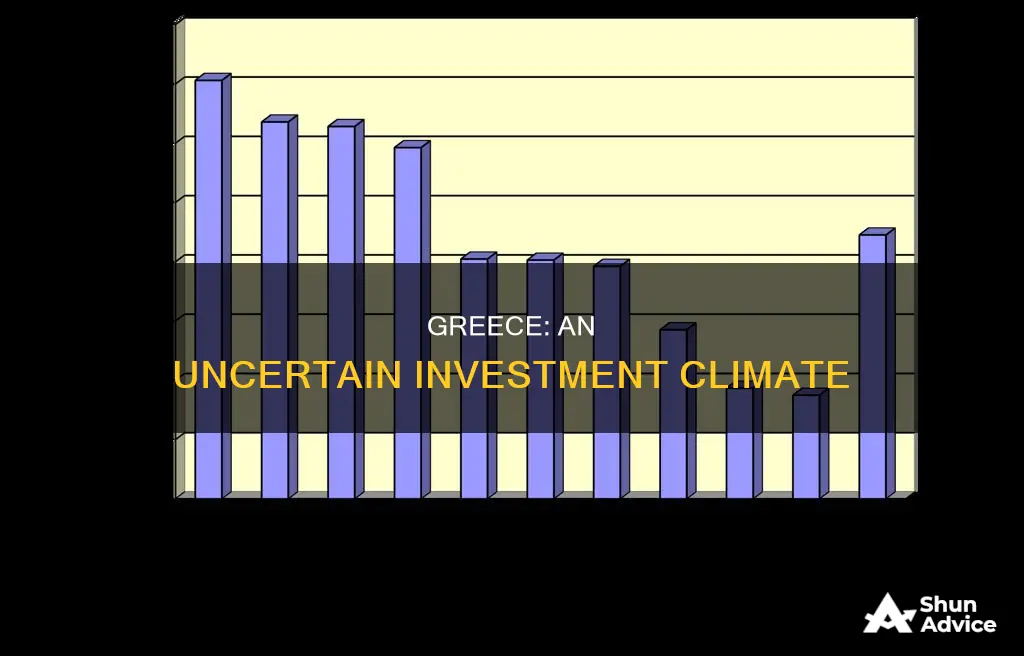
Greece has been in dire financial straits for over a decade, with the country's economy experiencing a huge downturn since the 2007-2008 financial crisis. In 2015, Greece became the first developed country to default on a payment to the International Monetary Fund (IMF). The Greek government-debt crisis was a central focus of the wider European debt crisis, with the country requiring bailout loans in 2010, 2012, and 2015 from the IMF, Eurogroup, and the European Central Bank. While the country returned to modest growth rates in 2017, 2018, and 2019, the economic impact of the Covid-19 pandemic is expected to cause a severe recession. However, despite the country's depressed economy, there are still a lot of companies that are incorporated in Greece and are doing well.
What You'll Learn

Greece's economic crisis
There were many factors that contributed to this large and severe economic crisis, including the cumulative impacts of the Great Recession, an already-weak Greek economy, and Greece's membership in the Eurozone, which provided it with less policy flexibility. The crisis was also exacerbated by the economic impact of the Covid-19 pandemic, which caused a severe recession in the country.
Despite the country's reforms, multiple tax increases, and spending cuts, Greece still required bailout loans in 2010, 2012, and 2015 from the IMF, Eurogroup, and the European Central Bank, in addition to negotiating debt relief from private banks in 2011. The country managed to return to modest growth rates in 2017, 2018, and 2019, but the future of the Greek economy remains uncertain.
The economic crisis has created investment opportunities in Greece, particularly in the real estate market, which saw a price dip of almost 50% at the end of 2018. There is also a suspension of Value Added Tax (VAT) on new buildings, which is expected to revive the real estate market and boost construction activity. Additionally, Greek startups are undervalued compared to American and European ones, presenting a potentially lucrative opportunity for early-stage investors.
Overall, Greece's economic crisis has been a challenging period for the country, but there are signs of recovery and potential investment opportunities for those willing to take on a degree of risk.
Black Wealth: Investing Strategies
You may want to see also

The Euro's value
Greece's economic crisis has been well-documented, and the country has been in dire financial straits for over a decade. In 2015, Greece became the first developed country to default on a payment to the International Monetary Fund (IMF). The Greek government-debt crisis was a significant component of the wider European debt crisis, which occurred in the aftermath of the 2007-2008 financial crisis.
For example, a Greek company performing well and earning 10% this year may not look as promising when factoring in the exchange rate to convert to dollars. This is a critical factor for investors, as they may want to own the stock but avoid the currency.
However, it's not all negative. The Euro's value can also present opportunities for investors. As the Euro is struggling, investing in Greek companies can be a strategic move, as these businesses are still producing, selling, and earning money. It is a risk, but one that could pay off handsomely if the economy recovers.
Additionally, the Greek government has implemented a series of reforms, and the hard-working Greek people have contributed to a slow but steady recovery. The country is showing promising signs of growth, and there is a burst of optimism. International investors are taking note, with Greece regaining their trust and demonstrating a healthy growth rate.
In summary, while the Euro's value might be a concern for potential investors in Greece, it also presents opportunities. The depressed economy and favourable exchange rates can be advantageous for those looking to invest directly in the country or its companies.
Who Manages Their Own Investments?
You may want to see also

Greek startups' value
Greece's economy has been depressed for quite some time, and the country has struggled with debt and financial woes. However, Greek startups present an attractive investment opportunity, with the total value of Greek startups estimated at 8 billion euros in 2022, the second-highest amount in Southeastern Europe.
In 2023, more than 70 Greek companies received funding totalling over 485 million euros, with 78% of investments coming from abroad. The top sectors for investment were RetailTech, Artificial Intelligence (AI), and AgriTech, reflecting global trends. Greek startups have also attracted the interest of US-based technology giants, with companies like Hewlett Packard Enterprise, Cisco, Dell, and Intel completing successful acquisitions in 2023.
Despite challenges in finding financing and ensuring sustainability, Greek startup officials estimate that the local industry's valuations are reasonable. Greece has a specialised and highly trained workforce, with 46.4% of the total labour force holding a higher education degree.
Some notable Greek startups across various sectors include:
- Vulcan Forged: A blockchain game studio and NFT marketplace.
- Harbor Lab: Software for optimising port cost management.
- Spotawheel: A tech-driven used car dealership platform.
- LANGaware: A language-agnostic platform for early diagnosis of neurodegenerative and psychiatric diseases.
- FlexCar: An international automotive leasing company offering flexible solutions.
- Brite Solar: A developer of innovative nanomaterials and processes for agriculture, energy, and building applications.
- Prosperty: A digital-first real estate platform disrupting the traditional market.
- Safe(ci)ty: A system using AI and sensors to monitor building structural conditions and improve earthquake response.
- Innovation Bee: A software development firm creating AI-powered solutions.
These startups showcase the potential of Greek companies and the opportunities available for investors.
Young Investors: CDs Worth It?
You may want to see also

Country's bureaucracy
Greece's bureaucracy has been described as a snarl of rules that is difficult to untangle. The country's bureaucratic system is characterised by ambiguity, with a foundation that stems from the Byzantine and Ottoman empires.
The Byzantine Influence
In the Byzantine Empire, public offices could be purchased. For example, to become a church beggar, one had to pay the priest a commission to reserve a seat on the church steps.
The Ottoman Influence
The Ottoman Empire also played a role in shaping Greece's bureaucracy. To become the Grand Vizier, one had to bribe the sultan with large sums of money and ensure no one else could take their spot, even if it meant serial killing.
Public Servants
Almost a third of Greece's population are public servants. Greek citizens view bureaucrats as corrupt and lazy, while bureaucrats see taxpayers as mafia characters trying to trick the government. This has resulted in a vicious cycle where politicians bribe voters with government jobs in exchange for votes.
Inefficiency and Weakness
Greece's bureaucracy is relatively large but inefficient and weak compared to political parties. The administrative system is controlled by governing parties, resulting in an extensive ebb and flow of personnel and structures with each change in power. Greek bureaucrats often lack expertise in modern management methods and new technologies.
Impact on Businesses
Greece's bureaucracy has posed significant challenges for businesses, including difficulties in obtaining necessary documents and navigating complex tax rules. This has created uncertainty and hindered economic growth, with some businesses even facing closure due to bureaucratic obstacles.
Impact on Foreign Investment
Greece's bureaucratic challenges have also been cited as a concern for foreign investors, who may be deterred by the complex and inefficient system.
Efforts for Reform
Prime Minister Alexis Tsipras has acknowledged the need for reforms and has vowed to streamline the bureaucracy. However, the entrenched nature of the bureaucratic system and the political factionalism within it present significant obstacles to implementing meaningful changes.
Financial Literacy: Powering Personal Finance
You may want to see also

Greek bonds
The Greek economy is depressed, and the country is still recovering from the crisis. However, for investors willing to take on the risk, Greek bonds can be a lucrative opportunity. The arguments for investing in Greek debt include the belief that the Greek economy and government will not completely collapse and the fact that the government has no significant debt obligations until 2023 due to its 2012 debt restructuring.
It is not easy for investors to buy Greek government bonds due to lack of access, liquidity, and the high minimum investment required. The only way to purchase these bonds is through a bank, broker, or hedge fund. The risk is considerable, and investing in Greek government bonds is suitable only for financially sound investors with a high tolerance for risk. There is a real possibility of losing the entire investment, so only those who can afford to do so should consider Greek debt as an option.
For those interested in investing in Greece, another option is to invest in Greek companies, many of which are still doing well despite the financial problems. These companies can be traded on U.S. exchanges, eliminating the risk associated with the dollar-euro exchange rate.
Marijuana Investing: Overcoming Investor Fear
You may want to see also
Frequently asked questions
People are wary of investing in Greece because of the country's recent economic crisis and subsequent recession, which was the longest of any advanced capitalist economy ever. Greece has also defaulted on payments to the IMF and required multiple bailout loans. The country is also burdened by its membership in the Eurozone, which provides it with less policy flexibility.
Investing in Greece comes with higher risks due to the country's economic situation. The value of the euro is slipping compared to other currencies, which could impact returns for investors. Additionally, Greece's MSCI index has fallen significantly, indicating the country's struggling stock market.
Despite the risks, there are also opportunities for investors in Greece. Greek startups are undervalued compared to their American and European counterparts, presenting a potential high-risk, high-reward investment. The country also has a strategic location, a highly educated workforce, and a growing economy, making it an attractive destination for doing business.







